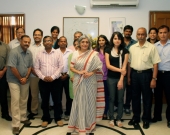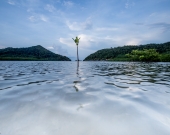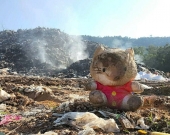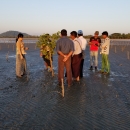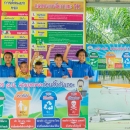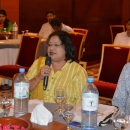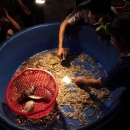Topics :: Apply knowledge :: Monitoring, Learning and Evaluation
Monitoring, Learning and Evaluation
Restoration of coastal ecosystems and rebuilding the lives of affected local communities received much attention in the wake of the 2004 Indian Ocean Tsunami. Conscious efforts from a wide range of sectors thereafter have contributed to bringing about positive changes in the management of impacted coastal areas. This has produced a large body of information at institutional and individual levels to be shared and utilized.
MFF believes that effective knowledge management, sharing of best practices and lessons learnt will play a valuable role in translating accurate knowledge into meaningful action.
To "build back better.." the vital link between coastal ecosystems and human livelihoods, MFF embraces a people-centered approach that creates opportunities for sustainable livelihoods and resilient communities. This approach is hinged on a philosophy of effective lesson learning and well informed planning process.
To realize its overarching goals of sustainable coastal management, MFF employs a robust monitoring mechanism. The MFF Monitoring Learning and Evaluation (MLE) process is designed for systematic collection of information, demonstrating results and capturing lessons learnt. Its analytical and adaptive nature allows real time feedback and enables emerging trends to be accommodated into the MFF plan.
For details about Actions, Outputs and Results, click [ + ]
Related News
MFF India Small Grant Mid-term Review
New Delhi, India 21 Sep 2012
Country: India
Topic: Knowledge for Management, Strategies for Management, Monitoring, Learning and Evaluation ...
The small grant mid-term review is a useful mechanism through which the progress of projects is evaluated and reviewed by the MFF Secretariat, NCB members and MFF partners.
Mangroves For the Future video: A look back
Bali, Indonesia 05 Oct 2018
Country: Global
Topic: Sustainable Livelihoods, Monitoring, Learning and Evaluation, Integrated Coastal Planning ...
IUCN Asia and Mangroves for the Future (MFF) have produced a video showcasing MFF’s growth and impact in Asia. This video was recently premiered at the 15th meeting of the MFF Regional Steering Committee that took place in Bali, Indonesia, at the end...
More effective waste management through engaged communities
Mairood, Thailand 15 Jun 2017
Country: Thailand
Topic: Capacity development, Coastal Governance, Monitoring, Learning and Evaluation
To most, it’s just a giant landfill – holding approximately 60,000 tonnes of waste. But to some of the locals of Trat province, the Had Ploy Dang dumping ground, located in the Mairood Sub-district, is known as the ‘golden mountain’. Why? Because, ac...
Featured Projects

Conserving mangroves as a local food source
Duration: May 2009 to November 2010
Location: Takauthung, Phang Nga, Thailand
Topics: Knowledge for Management , Monitoring, Learning and Evaluation , Civil Society Engagement , Gender equality , Knowledge management and communications
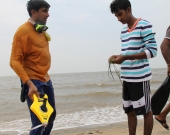
Evaluation of the present status of seagrass ecosystems along the west coast stretching from Kalpitiya to Thaleimannar.
Duration: 12 months (06/01/2012-05/31/2013)
Location: Puttalam, Mannar
Topics: Knowledge for Management , Coastal Governance , Monitoring, Learning and Evaluation
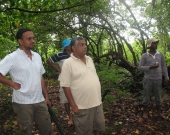
Mangrove diversity and related fishery in lagoon/estuarine systems in Potuvil- Panama coastal stretch.
Duration: 12 months (06/01/2012-05/31/2013)
Location: Pottuvil, Panama
Topics: Knowledge for Management , Monitoring, Learning and Evaluation , Integrated Coastal Planning
Featured Film - Interview with Malik Amin Aslam Khan, IUCN Vice President
Interview with Malik Amin Aslam Khan, IUCN Vice President, Hoi An, Viet Nam © IUCN, 2013
IUCN Vice President speaks about climate change related vulnerabilities in Asia and the need for a Global Mangroves Alliance at the 10th Regional Steering Committee Meeting of the Mangroves for the Future Initiative held in Hoi An Viet Nam from 11- 14 September 2013
Related Events
MFF Phase 3 Regional Completion Workshop
Bangkok, Thailand 17 Dec 2018
MFF Phase 3 National Completion Workshops
Each MFF country 01 Nov 2018
14th Regional Steering Committee Meeting
Yangon, Myanmar 28 Sep - 02 Oct 2017
Related Images
Related Publications
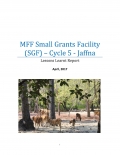
MFF Small Grants Facility Cycle 5 Jaffna - Lessons Learned Report
Author: MFF Sri Lanka
Publisher: MFF Sri Lanka
Posted on: 22nd Apr 2019
Category: SGF (Small Grant Facility)
Size: 1.1 MB

Impact Evaluation Report - Updates on 2016 Small Grant Facility Project Data Compilation
Author: MFF Indonesia
Publisher: MFF Indonesia
Posted on: 15th Feb 2019
Category: SGF (Small Grant Facility)
Size: 6.8 MB
